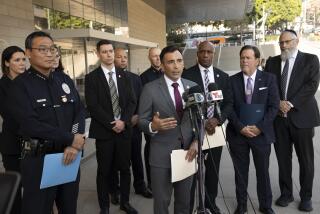Mistrial Declared in Case Against Rabbi : Courts: After 25 days, a federal jury deadlocks 11 to 1 in favor of convicting Abraham Low and a co-defendant in a money-laundering scheme.
- Share via
After one of the longest deliberations in the history of the Los Angeles federal courthouse, jurors have failed to reach a verdict in the high-profile money-laundering trial of an Orthodox rabbi and his co-defendant.
U.S. District Judge Robert M. Takasugi declared a mistrial Friday after a jury told him that it had deadlocked 11 to 1 in favor of conviction on all 20 counts against both Rabbi Abraham Low and co-defendant Sharlesetta Brown.
The prosecutor, Assistant U.S. Atty. Leslie A. Swain, said, “Eleven jurors thought the evidence was overwhelming, but there was one irrational juror.” The government will retry the case, she said.
However, Low’s attorney, Stephen D. Miller, said that he had interviewed the lone holdout on the jury and had found her to be “a very sensible, logical person who processes information thoroughly.” Miller said the juror, an African-American, told him she felt a number of other jurors were racist.
Wednesday, the foreman of the jury sent out a note stating that after considering the case for 25 days, the panel had been unable to reach unanimous verdicts on any of the counts.
There was a two-day delay in further proceedings because Takasugi had been out of the city on other judicial business.
At a Friday morning court session, Takasugi had rejected the prosecution’s request for a special hearing to determine whether Juror No. 22, the panel’s only black member, should be removed because of alleged bias, a request that had been vigorously opposed by defense lawyers.
Swain requested the special hearing in the wake of two “extraordinary notes” sent out by jurors earlier this week. One of the notes, signed by nine jurors, said “one juror on the panel has consistently impeded the deliberation process with her prejudice and bias.”
Swain quoted the note as saying the juror had told her colleagues, “White man’s justice is the black man’s hell.” On another occasion, according to the note, the juror had said, “There are a lot of innocent people in jail; I saw it on TV.” Defendant Brown is African-American.
The prosecutor said an inquiry was needed to determine if the juror had violated an oath she took to judge the case without bias or prejudice.
Both defense lawyers vigorously objected to any questioning of the juror. The comments attributed to the juror “are not illogical or irrational, given the facts of this case,” Miller said.
“This case involves a racially biased government informant,” Miller said. “This juror has stated her belief that the government has not proved its case against either defendant. . . . There is no legal ground for removing her from the jury.” Brown’s lawyer, Joseph F. Walsh, said it would be improper for the judge or the lawyers to “invade the deliberative process of the jury.”
Takasugi agreed. He said there was nothing in the notes that indicated the juror in question had been incompetent, had refused to deliberate or had engaged in any misconduct, “meaning the notes don’t constitute just cause” for discharging the juror.
Rather, he said, Juror No. 22 had indicated that she did not believe the government had proved its case against either defendant.
Takasugi said that courts traditionally have been loath to invade the sanctity of deliberations and question a juror’s motivations. In particular, Takasugi cited one recent case that held that if the evidence discloses “any possibility” that a request to discharge a juror stems from the juror’s view of the sufficiency of the government’s evidence, the court must deny the request.”
However, Takasugi, after briefly questioning jury foreman Rhamash Bharania, a Rowland Heights defense contract auditor, told the jurors to discuss whether they still might be able to reach unanimous verdicts and report back to him. About 4:30 p.m. Friday, the jurors sent a note saying they were “hopelessly deadlocked.”
The notes this week represented the latest episode in long and stormy deliberations. The jurors sent out 20 notes and made numerous requests to review videotapes.
In mid-October, the original jury foreman, John Applequist, a Santa Barbara letter carrier, resigned, stating that he had been unable to keep discussions pertinent. He characterized the deliberations as “emotionally charged.”
Low, Brown and a third defendant were arrested in January and indicted on 20 felony charges. The third defendant, Alan J. Weston, agreed to plead guilty and testified against the other two.
According to the indictment, Low told an undercover FBI agent that for a 30% cut, he could launder as much as $5 million a week through an overnight network of couriers who would ferry drug-tainted cash.
Low, who has steadfastly maintained his innocence, also was accused of defrauding Home Savings & Loan when his wife deposited a stolen and forged Bank of America cashier’s check for $496,000 and then withdrew a similar amount in four legitimate cashier’s checks. The government alleged that there was a third illegal scheme, involving six counterfeit checks totaling $6 million.
Defense lawyer Miller tried on several occasions to undermine the prosecution’s case by saying the government had relied on a convicted felon, Christopher Golasz, as its paid informant.
He contended that Golasz was prejudiced against the rabbi and Brown because he is “an anti-Semite and a racist.”
Prosecutor Swain countered by saying that although Golasz made some inappropriate remarks, the government hardly relied on him alone, and that there was considerable evidence against the defendants.
If convicted, Low, who has been the rabbi at Mogen Abraham on La Brea Avenue for 16 years, could have faced decades in prison and millions of dollars in fines.
More to Read
Sign up for Essential California
The most important California stories and recommendations in your inbox every morning.
You may occasionally receive promotional content from the Los Angeles Times.













